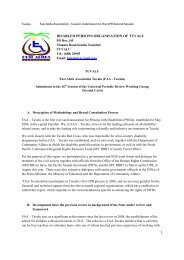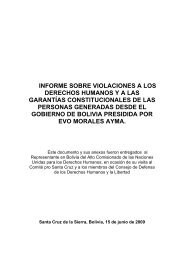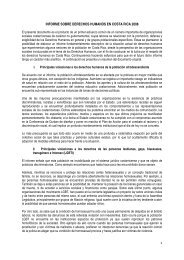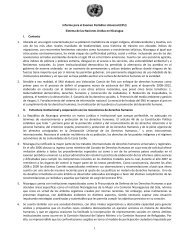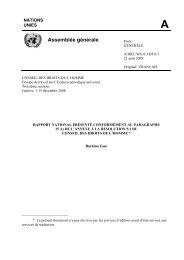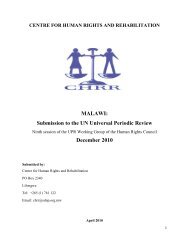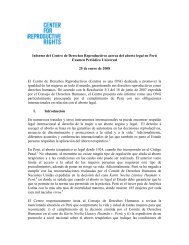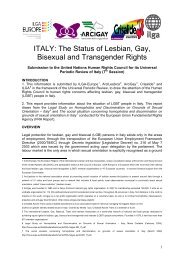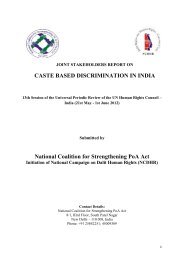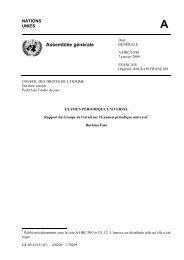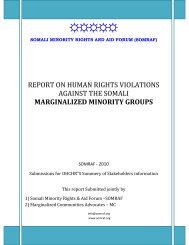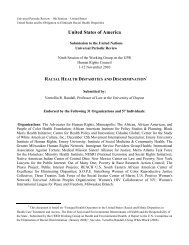Prison Needle Exchange: Lessons from a Comprehensive Review ...
Prison Needle Exchange: Lessons from a Comprehensive Review ...
Prison Needle Exchange: Lessons from a Comprehensive Review ...
You also want an ePaper? Increase the reach of your titles
YUMPU automatically turns print PDFs into web optimized ePapers that Google loves.
Health Reform in <strong>Prison</strong>s, with the cooperation of the Moldovan<br />
Ministry of <strong>Prison</strong>s and financial assistance <strong>from</strong> the Open Society<br />
Institute of the Soros Foundation Network, began delivering HIV<br />
prevention programs in prisons in 1999. 204 The organization went on<br />
to provide HIV and harm-reduction programs and services in all 19<br />
prisons in Moldova. These activities include the provision of HIV<br />
prevention education for prisoners and staff, peer education, the creation<br />
and dissemination of educational materials, the purchase of<br />
HIV-prevention and harm-reduction tools, the distribution of condoms<br />
and disinfectants, and the provision of sterile syringes in two prisons.<br />
Up to September 2002, the project had reached approximately 14,000 prisoners (79% of<br />
all prisoners in Moldova) and 1600 prison staff. The organization distributes condoms, disinfectant,<br />
and information in all Moldovan prisons. Since the project was started, over 30,000<br />
items of information have been distributed. 205<br />
In May 1999 a pilot prison<br />
syringe exchange program<br />
was established at<br />
<strong>Prison</strong> Colony 18, a<br />
medium/maximum-security<br />
prison with 1000 prisoners.<br />
Introduction of needle exchange/distribution programs<br />
The first program<br />
In May 1999 a pilot prison syringe exchange program was established. 206 The site chosen<br />
was <strong>Prison</strong> Colony 18 in Branesti. There were several reasons why PC18 was chosen for the<br />
pilot. These included its proximity to the city of Chisinau (the capital of Moldova, where the<br />
NGO coordinating the project is based), the fact that it was the prison with the lowest average<br />
age of prisoners (24 to 26 years old), and because at that time it had the highest known<br />
number of prisoners known to be living with HIV/AIDS (18 people).<br />
PC18 is a medium/maximum-security prison with a population of approximately 1000<br />
men. It was originally built in 1950 to house 250 people. The Moldovan prison system is a<br />
military system. <strong>Prison</strong> staff at PC18 include approximately 200<br />
correctional officers (who are soldiers) and 100 non-military staff.<br />
All prisoners in the institution work at one of several prison industries.<br />
These include underground stone mining, agricultural and<br />
livestock cultivation, grain milling, and baking.<br />
The <strong>Prison</strong> Administration of the Ministry of Justice was initially<br />
reluctant to authorize the project due to concerns that the provision<br />
of sterile needles would lead to an increase in drug use. However,<br />
these concerns were assuaged by the results of an anonymous survey<br />
of prisoners that demonstrated that as many as eight to 12 prisoners<br />
were sharing one needle, and that some people were using<br />
homemade needles, to inject drugs. On 3 December 1999, Order 115 was enacted, authorizing<br />
the establishment of the needle exchange in PC18.<br />
The pilot program in PC18 evolved through two stages. During stage one needles were distributed<br />
hand-to-hand to prisoners through the prison medical unit. During the four or five<br />
months that this distribution system was in place, between 40 and 50 needles were exchanged.<br />
However, the project team decided that this method of distribution was not satisfactory.<br />
Their most significant concern was that the needle exchange was being accessed by only<br />
25% to 30% of the prisoners known to inject drugs. A number of barriers were identified by<br />
Dr Nicolae Bodrug, head of the prison medical unit, who was responsible for coordinating<br />
the project. These included difficulty in establishing a rapport between the medical staff and<br />
To make the needle exchange<br />
genuinely anonymous, the<br />
prison medical unit recruited<br />
eight prisoners as secondary<br />
exchange volunteers to work<br />
throughout the penal colony.<br />
38 <strong>Prison</strong> <strong>Needle</strong> <strong>Exchange</strong>: <strong>Lessons</strong> <strong>from</strong> a <strong>Comprehensive</strong> <strong>Review</strong> of International Evidence and Experience



